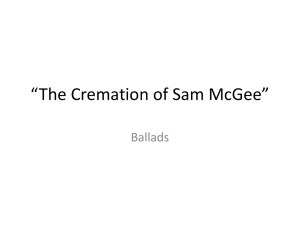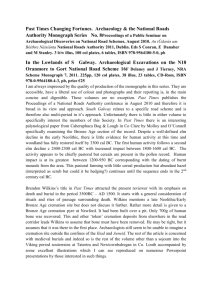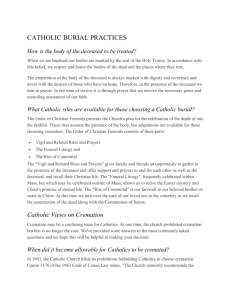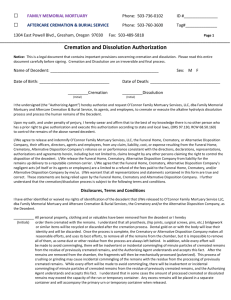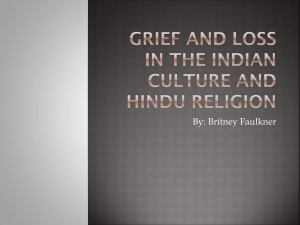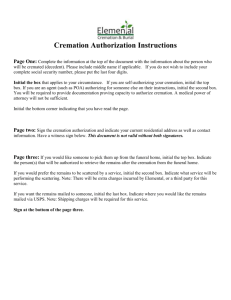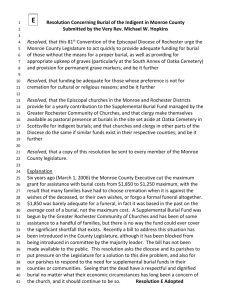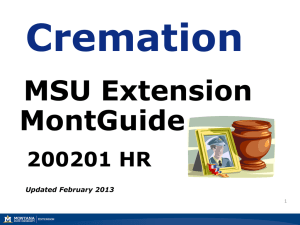What About Cremation? - The Voice in the Wilderness
advertisement
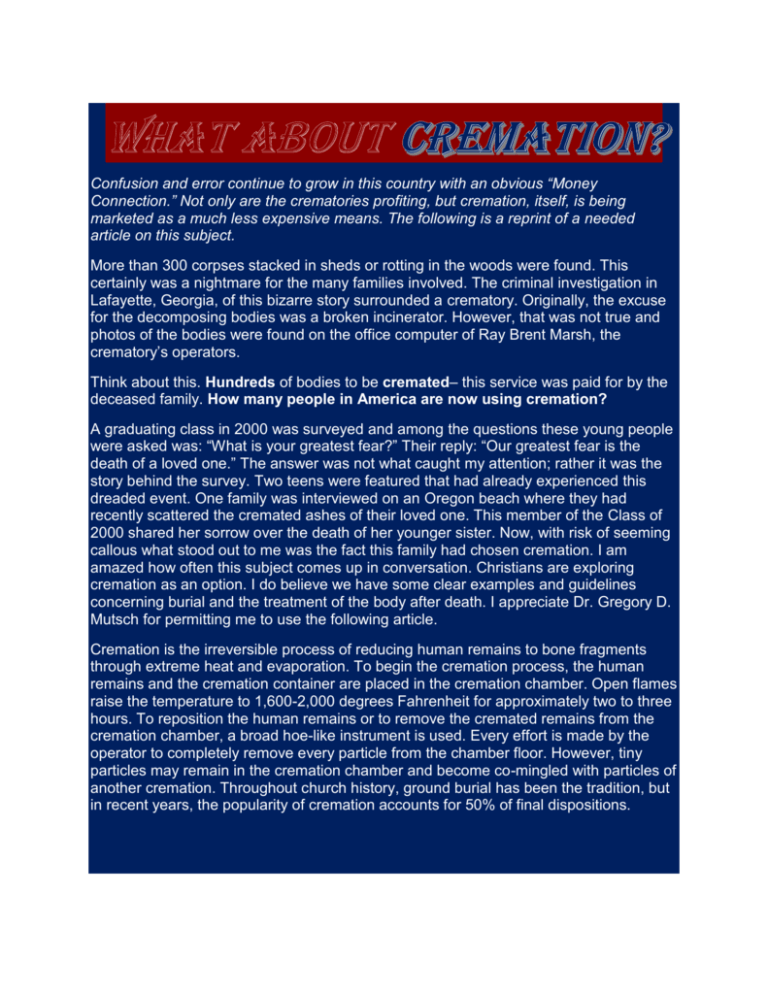
CREMATION? Confusion and error continue to grow in this country with an obvious “Money Connection.” Not only are the crematories profiting, but cremation, itself, is being marketed as a much less expensive means. The following is a reprint of a needed article on this subject. More than 300 corpses stacked in sheds or rotting in the woods were found. This certainly was a nightmare for the many families involved. The criminal investigation in Lafayette, Georgia, of this bizarre story surrounded a crematory. Originally, the excuse for the decomposing bodies was a broken incinerator. However, that was not true and photos of the bodies were found on the office computer of Ray Brent Marsh, the crematory’s operators. Think about this. Hundreds of bodies to be cremated– this service was paid for by the deceased family. How many people in America are now using cremation? A graduating class in 2000 was surveyed and among the questions these young people were asked was: “What is your greatest fear?” Their reply: “Our greatest fear is the death of a loved one.” The answer was not what caught my attention; rather it was the story behind the survey. Two teens were featured that had already experienced this dreaded event. One family was interviewed on an Oregon beach where they had recently scattered the cremated ashes of their loved one. This member of the Class of 2000 shared her sorrow over the death of her younger sister. Now, with risk of seeming callous what stood out to me was the fact this family had chosen cremation. I am amazed how often this subject comes up in conversation. Christians are exploring cremation as an option. I do believe we have some clear examples and guidelines concerning burial and the treatment of the body after death. I appreciate Dr. Gregory D. Mutsch for permitting me to use the following article. Cremation is the irreversible process of reducing human remains to bone fragments through extreme heat and evaporation. To begin the cremation process, the human remains and the cremation container are placed in the cremation chamber. Open flames raise the temperature to 1,600-2,000 degrees Fahrenheit for approximately two to three hours. To reposition the human remains or to remove the cremated remains from the cremation chamber, a broad hoe-like instrument is used. Every effort is made by the operator to completely remove every particle from the chamber floor. However, tiny particles may remain in the cremation chamber and become co-mingled with particles of another cremation. Throughout church history, ground burial has been the tradition, but in recent years, the popularity of cremation accounts for 50% of final dispositions. FIRE FREQUENTLY REPRESENTS JUDGMENT IN THE BIBLE God destroyed Sodom and Gomorrah with fire (Gen.19:24). He used fire to judge Nadab and Abihu for their inappropriate sacrifices (Lev. 10:1-2) and to punish those who were insubordinate to the spiritual leadership of Moses (Num. 16:1-32, 35). When Achan disobeyed God’s prohibition of claiming possessions from the cities destroyed during the conquest, he was stoned and burned with fire (John 7:15, 25). God’s final judgment of this world will be by fire. “Wherein the heavens being on fire shall be dissolved and the elements shall melt with fervent heat” (2 Pet. 3:12). God destroyed the whole world once with a flood, but His second and final judgment will be by cremation. The final abode for those who reject Christ will be in a place of fire. “And whosoever was not found written in the book of life was cast into the lake of fire” (Rev. 20:15). It is inconsistent for Bible believers who have been saved from the judgment of fire to use this method to dispose of their bodies at death. THE NEW TESTAMENT PATTERN IS GROUND BURIAL The supreme example for a Bible believer is Jesus Christ in both His life and death. “...leaving us an example, that we should follow his steps” (1 Pet. 2:21). Jesus was buried because this was consistent with Old Testament Jewish history and because burial fulfilled the plan of God (Isa. 53:9). Jesus Christ is the author of the New Testament in which cremation is not once practiced. Ground burial in contrast was employed for John the Baptist (Mark 6:29), the Rich Man (Luke 16:22), Lazarus (John 11:17-19), Ananias and Sapphira (Acts 5:6-10). G GR RO OU UN ND DB BU UR RIIA ALL H HO ON NO OR RS S TTH HE E TTE EM MP PLLE EO OFF TTH HE EB BO OD DY Y Man is a three-part being: body, soul and spirit. All three parts belong to God since man is created in God’s image (Gen. 1:27). When a man becomes a Christian, God’s spirit takes up residence within him, and from that time, his body is God’s temple. “Know ye not that your body is the temple of the Holy Ghost which is in you, which ye have of God, and ye are not your own? For ye are bought with a price: therefore glorify God in your body, and in your spirit, which are God’s” (1 Cor. 6:19- 20). Although God’s Word does not give us a declaration regarding cremation, it does teach us principles by which we can reach a Biblical conclusion. Since we do not own our bodies, we do not have the right to do as we choose. To adopt a practice which has pagan roots is to dishonor the temple of God. Although cremation is popular in our modern culture, nowhere is it practiced by believers in the Old Testament, New Testament, or in the early history of the church. Romans 15:4 declares, “For whatsoever things were written aforetime were written for our learning.” The lesson clearly taught is that God’s people from Moses to Jesus Christ chose not to be cremated. --Dr. Gregory D. Mutsch, Ed.D. Now, take a few minutes to read what the Apostle Paul says in Romans 6:1-5. Note that those of you who “...were baptized into His death? Therefore we are buried (not cremated) with Him by baptism into death; that like as Christ....” Profound teaching and illustration we believers are given here by the Holy Spirit. Where does the idea of cremation come from? On the other hand, where do we get our teaching about the believers’ death, burial, and resurrection unto eternal life? Cremation is becoming very popular in this country and many believers and pastors have questions as to its origin and appropriateness for the Christian. For the sake of time, let me just make the following comments and leave it at that: 1. Cremation irrefutably, without a doubt, has its origin and roots in paganism. 2. From the Old Testament to the early church, burial was the practice, not cremation. 3. With the bones of Joseph (Ex. 13:19) to the borrowed tomb of Joseph of Arimathaea, great care, respect, and expense is taken for the body. Read about that alabaster box of ointment and the fact no rebuke came from Jesus (Mark 14: 3-9). 4. As far as the value of the body itself, well that’s not the point. It’s not necessarily the value of a thing, but the value is in doing what is right. A rich man’s tithe probably exceeds in value the widow’s mite but...Cain’s fruit of the ground versus Abel’s firstling – which was more valuable? I do know which was right. What’s valuable about Joseph’s old bones? But Moses knew what was right. What is so valuable about this old body? Well, the Bible has a lot to say about the temple, raising of the dead, corruptible putting on incorruption and the bodily resurrection and on and on! 5. When it comes to accidentally or intentionally burning the body, God is sovereign and omnipotent over atoms, molecules, ashes and dust. He will have no problem with bodies on the resurrection day. 6. 1 Cor. 13:3 – Paul is talking about martyrdom not cremation. In 1 Samuel 31:12 they burnt the bodies of Saul and his sons. Of course you know how Saul died. I will not describe for you what these mutilated, bird-picked decaying bodies were like. This was not cremation. This was preparation for burial of incredibly emaciated bodies. Note the burial in 1 Samuel 31:13. Lastly, 1 Kings 16:15-19 is not cremation but “For his sins which he sinned in doing evil in the sight of the Lord.” In one service, I finished preaching, gave the invitation, and moved to the door to shake hands as folks began to file out of the auditorium. This church had been without a pastor for sometime, and on several occasions I was asked to fill the pulpit. A man and wife came by to express appreciation for my help and request prayer. This lady’s mother had just passed away and to my shock the body was cremated. Here is another experience I’ve had with cremation. A lady in our church and her husband decided to take a three-month trip to Alaska. Sue and Tom (names changed) owned a beautiful home and asked my family and I to do house sitting for them, and we did. Tom’s brother traveled with them to Alaska, but sad to say, Tom’s brother died while in Alaska. His body was cremated and sent to me via USPS. Needless to say, Tom’s brother sat on the shelf until they returned home!
